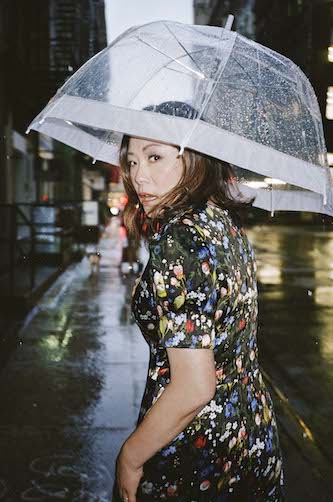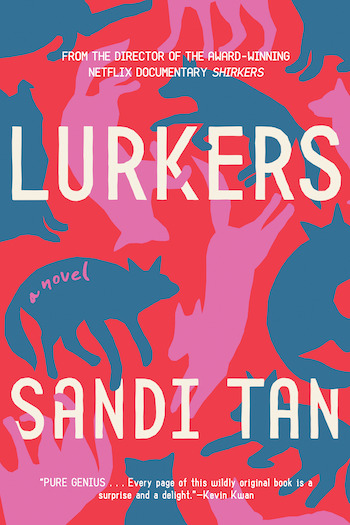Author Interview: Sandi Tan on “Lurkers”
By Chelsea Spear
“The suburbs of Los Angeles are so often neglected in literature and film because they are so seemingly impervious to adoration.”

Author Sandi Tan. Photo: Chris Bernabeo
Over the past decade, Sandi Tan has established herself as a thoughtful, compelling writer in many media. Shirkers, her debut documentary, looked at the long afterlife of a feature film she and her friends made in Singapore in the early 1990s. Tan balanced confessional interviews and ruminative voiceover with kaleidoscopic visuals and a collagey editing style that gave the film an inventive quality, like a fanzine come to life. As a features writer for Vanity Fair, she’s brought a perceptive approach and a wry sense of humor to her profiles of Oscar-winning filmmakers Bong Joon-ho and Chloe Zhao.
After publishing the epic novel The Black Isle in 2012 — which told the story of Singapore from the perspective of a spirit medium — Tan has reemerged as a fiction writer with the new novel Lurkers (Soho Press, $27). The book unfolds as a series of episodic character studies among the denizens of Santa Claus Lane, an idyllic-seeming suburban neighborhood in Los Angeles. The eclectic cast of characters and Tan’s vivid-yet-unassuming style play like a magic trick, and the way the characters’ lives eventually come together is all the more poignant for its unexpectedness. After reading Lurkers, I was curious about how Tan pulled off such a unique and satisfying read, so I emailed her some questions about her writing process.
AF: What inspired Lurkers? Were you interested in writing these characters first, or were you drawn to the setting and wanted to write a story around it?
Sandi Tan: I was living in the setting and not much drawn to it. The suburbs of Los Angeles are so often neglected in literature and film because they are so seemingly impervious to adoration. Their charms are not immediately, or even intermediately, apparent to the casual observer — and are often best deployed in satire or horror. The burbs here are mental flyover country. People live in their private fiefdoms, refusing to acknowledge that their home belongs to the larger ecosystem of their neighborhood. You see individualism gone amok, with an English Tudor cottage and a Spanish colonial adobe and some aircraft carrier of a McMansion, all standing cheek-by-jowl.
I don’t mock that impulse, I embrace it — because I understand that deep need to proclaim your fantasy real. Living in Los Angeles is very unmooring. The unknowability and alienation of Los Angeles (so sprawly, so messy, so made up of so many bits) brings out the homesteader in every right-minded person — some do it outwardly, many others in the private land parcels of their minds. I myself needed to pantomime some kind of attraction to this unloveable, unlikable terrain in the hopes that genuine affection might follow, and I thought that one way to accomplish this would be to do the writerly version of peeking into windows and crawling into basements like a prowler. I had to have my neighbors manifest interestingness or I’d go insane with boredom. I could not let myself believe that those insipid canvas-tote carrying, sample-gorging, idle-chitchat-engaging personages I saw at the Farmers Market or that those nervous, gruff, handbag-clutching immigrants who wouldn’t look you in the eye were the sum total of their external qualities. I couldn’t let myself believe that grim, grim stuff. As somebody who played with dollhouses way past the age it was deemed appropriate, I wanted to extract some of these figures from their houses and throw them into scenarios that might produce amusing results.
AF: Writer Deborah Vankin wrote in a 2012 interview for the Los Angeles Times that you were a third of the way through your follow up to The Black Isle and that it was nothing like your first novel. Is this the book you were writing then? On a larger level, what was your process for this one? How did you keep track of the different characters and their intersections with one another?
Tan: Alas, no. It was some other novel I ended up not finishing because when I told my then-editor at Grand Central Publishing (the publisher of The Black Isle) that I was working on a family epic that advanced backwards, he looked sick to his stomach and I thought he was going to throw up his tuna carpaccio lunch. He’d been expecting a vampire epic (which I did say I was working on, and which I’d also abandoned). I lost my nerve. I started writing Lurkers in the mid-aughts, around the time when most of the action in the book is set — 2006-2007 — when the paranoiac and destabilizing effects of 9/11 were still being felt and lived out. And I came back to it years later, after I ran into my Soho Press editor friend Mark Doten at a screening of Shirkers at the Brooklyn Academy of Music in 2018 and he asked me about “that old book” I’d been working on long ago. So I dug up the desiccated old unfinished file and worked on it while promoting Shirkers and waiting for other things to come to fruition, and then one day I said, Fuck it, and emailed the entire manuscript to him, and he took it. And that was that.
AF: This book is largely set outside the film industry. Since Los Angeles is an industry town, and since you’re a filmmaker, did you make a conscious decision to keep the movie industry out of the book?
Tan: Yes. But the side effects of the industry are felt in the lives of the inhabitants of Santa Claus Lane. Many of them are living in different genres of film — snarky teen girl indie, psychological horror, gynodrama — and they create new ones when their lives collide. I’m interested in these new hybrids.
AF: Your vivid depiction of the grotesque really stuck with me when I read this (and The Black Isle); you found beauty and humor in gross things, while still recognizing that they’re unpleasant. What draws you to that kind of vivid grotesque imagery?
Tan: I know not of which you speak!
 AF: In addition to writing novels, you’re also a contributor to Vanity Fair and you’ve written a few screenplays. When in the writing process do you know if something is a screenplay or a novel? What aspects of the story make it fit into a particular format?
AF: In addition to writing novels, you’re also a contributor to Vanity Fair and you’ve written a few screenplays. When in the writing process do you know if something is a screenplay or a novel? What aspects of the story make it fit into a particular format?
Tan: I almost always begin seeing any story as a movie, or more lately, a television show… in my head. The form it actually takes, outside my head, is dictated by practical concerns. I wrote The Black Isle because at the time, and maybe even now, I knew it would be impossible to have it brought to life as a television show — it was too expensive, too exotic, too explicit — all the exes. And my heroine was not the pliant cutie pie or one-note-ishly “worthy” Asian woman they were used to; she was gifted, headstrong, but also given to making huge mistakes. And she was quite horny. It required producers and studios to have more imagination than they had at that point. In any case, I felt it would have taken a hundred years and battles that might have left me too winded to tackle anything else. It’d be much quicker for me to just battle it out alone at the computer and commit the words to print, so that’s what I did. To a lesser extent, this was also true of Lurkers, with its slightly sprawling cast. But with this novel in existence, I’m now able to use it as a blueprint as I work with some brilliant minds to develop it into a television series. Other times, I write screenplays because the plot might be something that’s more “high concept” (and potentially sellable) or it’s something I’m too lazy to write out as a novel first. So it’s a combination of pragmatism, animal instinct, and lassitude.
AF: Your documentary, and the film that would have been your first narrative feature, is called Shirkers. Where does the title Lurkers come from, and why did you choose a title so close to your movie?
Tan: I’m fond of one-word, Googleable titles. It is maybe an unfortunate coincidence that they should rhyme, but it was the correct word.
AF: What are you working on next? How is the adaptation of The Idiot coming along?
Tan: I’m working on a handful of exciting projects, most of which I can’t discuss yet. My screenplay adaptation of The Idiot is complete, and my producers are busy working towards making the film a reality, as the world begins to reopen (the second half of the film takes place in Europe). I had fun chatting with Elif Batuman about all of this and more in a conversation hosted by Film Independent on April 15.
Chelsea Spear has written for the Brattle Theatre’s Film Notes blog, the Gay & Lesbian Review, and Crooked Marquee. She lives in Boston.

Hello,
Would you include a link to the article Chelsea Spear wrote for The G&LR please?
https://glreview.org/article/klaus-nomi-countertenor-of-glam-rock/
Thank you,
Stephen